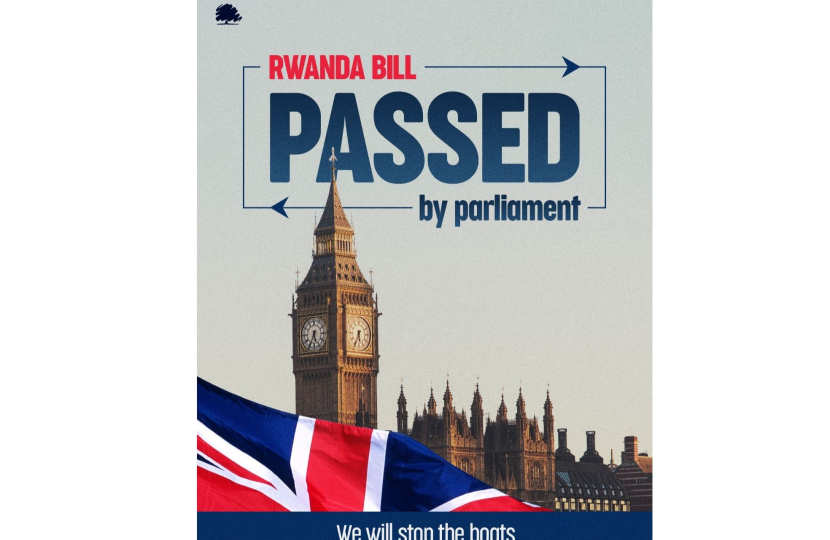
Last week, the Safety of Rwanda Act received Royal Assent. This means that after months of delay from Labour and their members in the House of Lords, the process to send the first flights of illegal migrants to Rwanda and deter people from coming here illegally has been started.
Richard Fuller MP said:
Last week the Rwanda Bill became law and, hey presto, over the weekend, the Irish government raised concerns about illegal migrants crossing the open border due to apprehension that they might be included in the Rwanda scheme. They have subsequently gone further and discussed sending police officers to guard the border.
It is early days, but quite an early and strong indicator of the potential disincentive effects of this new law.
While we have made good progress stopping the boats with the number of small boat arrivals falling by a third in 2023, it is not enough. For as long as this route is viable, people will keep coming. The only way to stop the boats is to remove the incentive to come by making it clear that if you come here illegally, you will not be allowed to stay.
This is one of the most complex operational endeavours carried out by the Home Office, but the government is ready and plans are in place.
The Safety of Rwanda Act confirms that Rwanda is a safe third country, allowing the government to get flights off the ground. This ensures that people cannot delay flights by bringing systemic challenges about the safety of Rwanda in our domestic courts. Now the Act has passed, the process of sending people to Rwanda has begun. This will take 10-12 weeks and includes the final training of caseworkers, working the casefiles for the initial cohort, quality assuring that casework as it is vital that casework is robust, allowing the Rwandans to check they are content with the specific cohort and serving removal directions. Statutorily this must be done at least 5 working days prior to flight.
The Bill makes it unambiguously clear that UK Parliament is sovereign, and the validity of any Act of Parliament is unaffected by international law. Ministers will be able to retain the decision on whether to comply with interim measures from the European Court of Human Rights, for example, a Rule 39 injunction.
The government is ready to deliver a first relocation flight and teams are working at pace to prepare. This includes:
- an airfield on standby and commercial charter planes booked for specific slots
- detention spaces increased to 2,200
- 200 trained dedicated caseworkers are ready and waiting to quickly process claims
- the judiciary have made available 25 courtrooms to deal with any legal cases quickly and decisively
- to escort illegal migrants all the way to Rwanda, we have 500 highly trained individuals ready, with 300 more trained in the coming weeks.
Responding to the concerns raised by the Supreme Court, the Safety of Rwanda Bill was introduced in December last year and builds upon the UK-Rwanda Treaty.
Together, these measures and evidence of changes in Rwanda since summer 2022, will allow government to implement the policy, supporting the wider plan to stop the boats by removing the incentive to come here illegally.
The new law, which is one of the toughest pieces of legislation ever introduced, builds upon the Treaty, reflecting the strength of the government of Rwanda’s protections and commitments relocated to Rwanda in accordance with the Treaty. It also:
- confirms that, with the new Treaty, Rwanda is safe
- prevents UK courts and tribunals from delaying or preventing a person’s removal to Rwanda on matters relating only to the general safety of Rwanda
- allows for an exceptionally narrow route to individual challenge to ensure that the courts will interpret the relevant provisions in accordance with the will of Parliament
- disapplies relevant sections of the Human Rights Act 1998
- confirms that only a Minister of the Crown can decide whether to comply with an interim measure issued by the European Court of Human Rights.
In November 2023, the Supreme Court upheld the lawfulness of resettling illegal migrants for the purposes of determining their asylum claims, but required more assurance that they would not be refouled. The internationally binding Treaty between Rwanda and the UK was announced by the government in response to this finding and introduces measures to make clear Rwanda will not return anyone to an unsafe country.
Under the Treaty, Rwanda has also introduced a strengthened end-to-end asylum system, including a new, specialist asylum appeals tribunal to consider individual appeals against any refused claims. It will have two co-presidents, from Rwanda and from another Commonwealth country, and be made up of judges from a mix of nations. The Treaty also enhances the role of the independent Monitoring Committee, which will ensure adherence to obligations under the Treaty and have the power to set its own priority areas for monitoring.
But this significant step forward remains just one part of the government’s wider plan to stop the boats. Solid progress has been made, with the number of small boat arrivals falling by more than a third in 2023. Our work with international partners prevented more than 26,000 crossings last year, as well as helping to dismantle 82 organised crime groups since July 2020.
Our new agreement with Albania has cut Albanian small boat arrivals by more than 90 per cent; and we recently signed a ground-breaking deal with Frontex, the European Border and Coast Guard Agency, marking another crucial step in securing our borders.
For full details on the Bill, please see the government website: https://www.gov.uk/government/collections/the-safety-of-rwanda-asylum-and-immigration-bill

